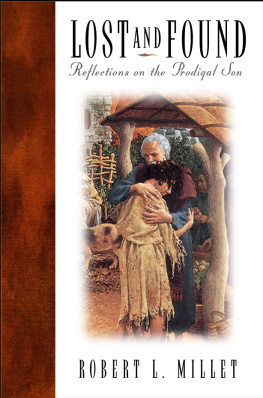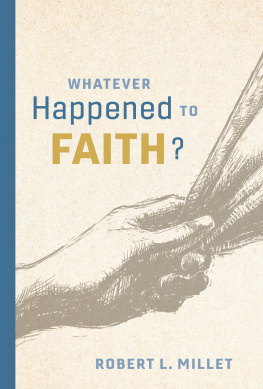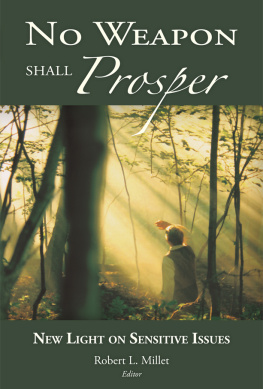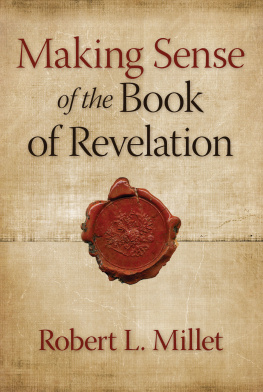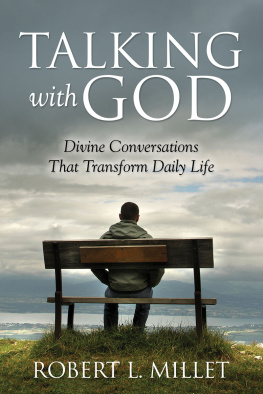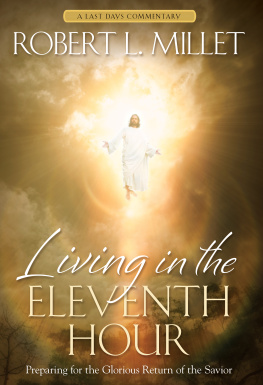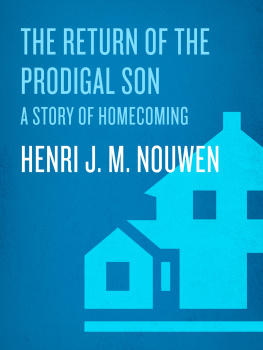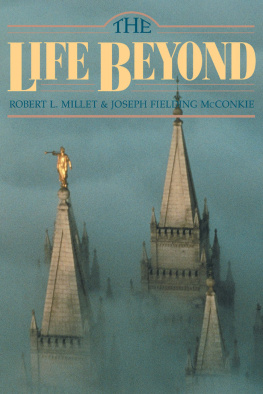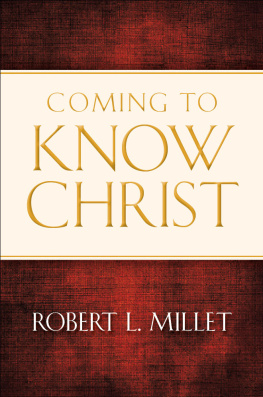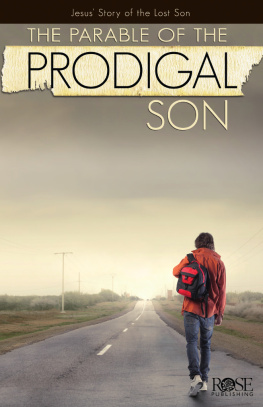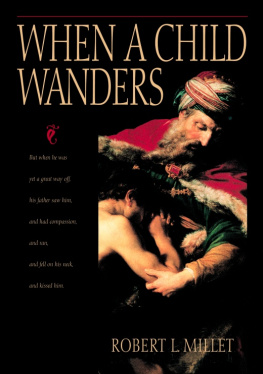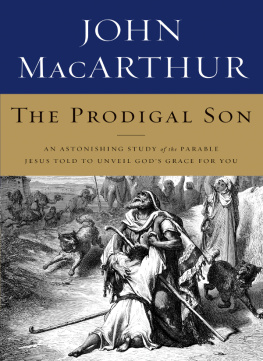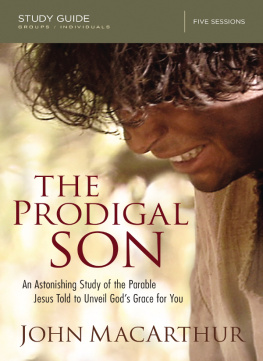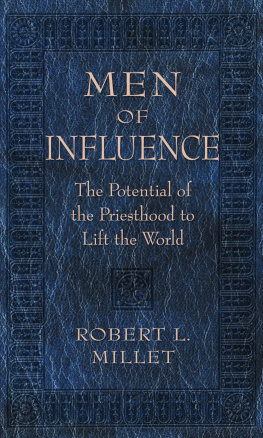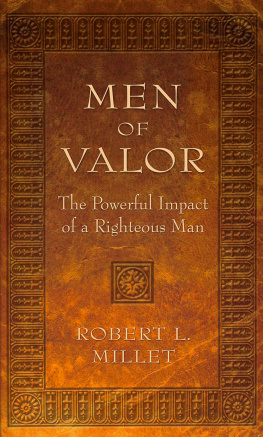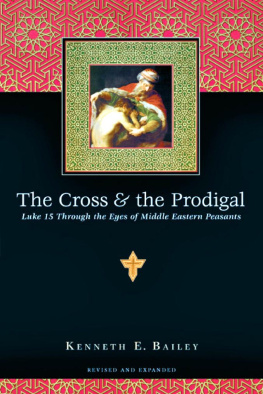Lost and Found
Reflections on the Prodigal Son
Robert L. Millet
2001 Robert L. Millet.
All rights reserved. No part of this book may be reproduced in any form or by any means without permission in writing from the publisher, Deseret Book Company (permissions@deseretbook.com), P.O. Box 30178, Salt Lake City Utah 84130. This work is not an official publication of The Church of Jesus Christ of Latter-day Saints. The views expressed herein are the responsibility of the author and do not necessarily represent the position of the Church or of Deseret Book. Deseret Book is a registered trademark of Deseret Book Company.
Interior illustrations 2001 James C. Christensen
Cover image 1999 James C. Christensen
Deseret Book is a registered trademark of Deseret Book Company.
Visit us at www.deseretbook.com
Library of Congress Cataloging-in-Publication Data
Millet, Robert L. Lost and found : reflections on the prodigal son / Robert L. Millet. p. cm. ISBN 1-57008-717-2 (alk. paper) 1. Prodigal son (Parable) 2. Church of Jesus Christ of Latter-day SaintsDoctrines. 3. Mormon ChurchDoctrines. I. Title.
BT378.P8 .M535 2001 226.806dc212001002679
Printed in the United States of America72876-6849
10987654321
Preface
Many years ago I sat opposite a young man who had been on an extended spiritual detour. He had been brought up in the Church, had known many of the sweet fruits of faith in the Lord, had been nurtured along by caring advisers and teachers, and had for years lived a life that one would describe as worthy and commendable. But one compromise and omission led to another. He wandered from the strait path, lost his place in the Church, and opened himself and those who loved him to unspeakable tragedy and heartache.
Now, after almost ten years away from life in the Church and fellowship with the Saints, he had come to himself. He looked around, noticed just how far he had strayed, and was courageous enough to ask hard questions: Where am I? What has happened to me? What have I done? Is this what I thought it would be like? Am I happy? What can I do? Where can I turn? Is it possible to somehow make up for all the mischief and deception and sin I have spread? Will my family and friends even consider letting me return? Or is all lost?
After weeks of pondering and deep reflection, he decided simply to go home. Showing up unexpectedly at his parents home, he called and asked to visit with me, his Church leader. We spoke of his sins, of the need for repentance, and of the miracle of forgiveness and renewal through the atonement of Jesus Christ. At a certain point in our conversation, he said with much fear and resignation, I dont know if I can do this. Im so far gone. The road back is so long.
I bore my testimony to him of the love of God, of the infinite and eternal atoning sacrifice of the Savior, and of my love for him and my willingness to walk beside him. As the days and weeks passed, we met together often. We read and applied the scriptures. We prayed. We fasted for strength. As the reality of the gospel, or the doctrine of Christ, began slowly to distil upon his soul, his hope for recovery and reconciliation began to grow. He spoke more and more often about coming back, about feeling and understanding what he had once felt and understood. The light of life, as found only in Jesus Christ (John 1:4, 9), began to shine in his countenance. His heart was changed. He had come home.
This book is about coming home, about straying souls who discover their plight and then, in a critical and vital moment, decide they do not want to live that way any more. They want to go home. Then begins the inner struggle: the doubts and fears, the worries and anxieties, the shame and embarrassment, all juxtaposed with the quiet but earnest hope that they will be loved and cared about and welcomed when they do arrive home.
The parable of the prodigal son is a story about a wandering son, about a faithful son, about a waiting father. It is a story about each of us as the prodigal son, for we all have sinned, and come short of the glory of God (Romans 3:23). It is a story about each of us as the older brother, for we must decide, at one time or another, how we will respond to the returning prodigal. And it is a story about each of us who aspires to godliness, for somewhere down the road of life, if we are serious about our Christian discipleship, we must choose to assume the role of the waiting father.
It is glorious and heartwarming to know that God our Father has a plan for his children, a plan of recovery, a plan of renewal and reconciliation, a plan of salvation, a plan by which those who wanderand that includes all of uscan pick ourselves up, dust ourselves off, and through the Atonement and the ordinances of salvation return home. Not one of us is bright enough or powerful enough to do it alone; we must have help. And were it not for divine assistance, each of us would falter and fail, would lose the battle of life. But thanks be to God, which giveth us the victory through our Lord Jesus Christ (1 Corinthians 15:57).
In the preparation of this manuscript, I am indebted to many persons. Members of the Religious Education faculty at Brigham Young University, as well as other colleagues in the Church Educational System, have asked good questions about this topic and made excellent suggestions. My long-time assistant, Lori Soza, has been, as always, efficient and thorough in her preparation of the manuscript for publication. Suzanne Brady of Deseret Book Company has made important editorial contributions to this book and offered invaluable recommendations for its improvement. But while I owe much to many, I alone am responsible for the views set forth in this book. Although I have tried to be true to the spirit and intent of the teachings of the scriptures and Church leaders, this work is a private endeavor and not an official publication of either The Church of Jesus Christ of Latter-day Saints or of Brigham Young University.
Part One

A certain man had two sons: And the younger of them said to his father, Father, give me the portion of goods that falleth to me. And he divided unto them his living.
Introduction
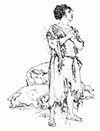
There is great value in being able to distil significant messages from a book of scripture or perhaps even from an important chapter or passage. So often we read through the scripturesday in and day out, week after week and month after month, from start to finishand do not take the time to step back, ponder, and reflect on the larger themes and doctrinal refrains that weave their way through the scriptures or the history of the Church.
I have found it especially helpful in teaching the Book of Mormon to returned missionaries, for example, to walk into class the first day and distribute copies of questions that will appear on the final examination. The students are generally stunned. They wonder why we would be contemplating the end in the beginning. Some of the questions I distribute include the following:
Explain how the Book of Mormon is a history of a fallen people.
Discuss how the Book of Mormon does indeed teach what great things the Lord hath done for [our] fathers.

